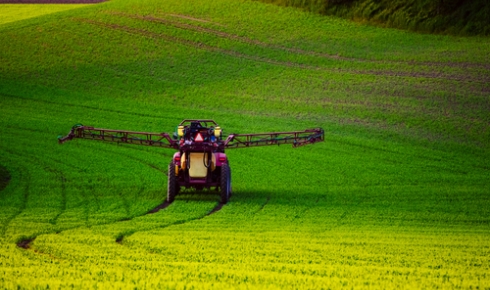We need a plan, not just a ban

Neonicotinoids look set to be totally banned across the UK. Do we have alternative pest control strategies that will be better for wildlife?
The Biologist 64(6) p6
Calls to ban ‘bee-harming pesticides’ heightened last year following the release of new field studies on the effects of neonicotinoids1, and against a background of reports of ‘ecological Armageddon’2 in the form of declining insect populations. Campaigners have therefore welcomed the recent news that environment secretary Michael Gove supports a total ban on the use of certain neonicotinoid pesticides3.
However, some scientists have warned of unintended consequences. One fear is that farmers will replace neonicotinoids with alternatives that may be even more damaging for wildlife. A ban may also reduce the effectiveness of other chemical control measures: our over-reliance on a few chemicals has already led to pest resistance, a problem that could be exacerbated if farmers simply replace neonicotinoids with classes of pesticide which are already widely used.
When the EU introduced the initial moratorium on the use of neonicotinoids on flowering crops, policymakers failed to support efforts to develop the alternative strategies needed to improve sustainability. Had this been done, the choices for the agricultural sector now might not be so worrying to those facing the prospect of significant yield losses caused by insect pests4.
The three neonicotinoids that have been banned since 2013 in the EU had been used extensively in the UK5.The potential impact on crop yields is fundamental to the decision of whether to ban neonicotinoids, yet there is a lack of reliable data on this. Losses are likely to vary enormously between crop types and environmental conditions.
While much discussion has surrounded risk caused by pesticides, less focus has been put on sustainable alternatives for crop protection. Overall, organic yields are approximately 20-25% lower than those from conventional agriculture6,7,suggesting that we are unable to sustain current levels of crop production without using inputs such as pesticides. With intensification of agriculture and a reduction in natural habitat implicated in declining bee populations, a predominant public focus on neonicotinoids also risks distracting us from other important factors affecting the health and abundance of bees and other insects.
Michael Gove has signalled a commitment to protecting farmland wildlife. However, the neonicotinoid ban alone won’t halt pollinator declines, and time will tell whether he puts in place policies which deliver sustainable agriculture that supports insects.
This is a more nuanced issue than the current debate reflects, and the best way forward may lie somewhere between a total ban and the widespread use of neonicotinoids which has occurred in the past. We would like to see a more judicious use of all pesticides, with a requirement for more targeted use. A neonicotinoid ban alone, without due consideration of potential yield losses and a clear strategy for alternative pest-control measures, could leave agriculture, and potentially insects, worse off.
Pest control options with fewer negative impacts on non-target species are urgently needed to replace existing pesticides. We need to develop and promote sustainable alternatives to pesticides in line with Integrated Pest Management strategies, such as optimal agronomic practices, host-plant resistance, better monitoring and biological controls, optimised using the latest technologies.
The Government’s 25 Year Plan to Improve the Environment includes the intention to review the UK National Action Plan for the Sustainable Use of Pesticides in 20188. With a strong steer from a committed policymaker taking a long-term view, this could be an opportunity to address these issues for the benefit of food production and biodiversity.
Dr Gia Aradottir is a research scientist specialising in sustainable crop protection
Dr Rebecca Nesbit is a science writer and author
1) Woodcock, B. A. et al. Science 356(6345) 1393–1395 (2017).
2) 'Warning of 'ecological Armageddon' after dramatic plunge in insect numbers.' The Guardian,18 Oct 2017.
3) 'UK will back total ban on bee harming pesticides.' The Guardian, 9 Nov 2017.
4) Kathage, J. et al. Pest Management Science 74(1) 88–99 (2018) DOI:10.1002/ps.4715.
5) FERA pesticide usage surveys
6) Ponisio, L. C. et al. Proc. R. Soc. B 282, 20141396.10 (2012).
7) Seufert, V. et al. Nature 485(7397), 229–32 (2012) doi: 10.1038/nature11069.
8) A Green Future: Our 25 Year Plan to Improve the Environment. DEFRA, Jan 2018.


